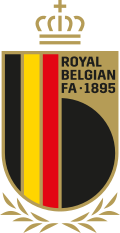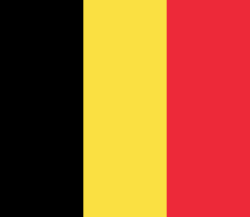Royal Belgian Football Association
The Royal Belgian Football Association (Dutch: Koninklijke Belgische Voetbalbond, KBVB; French: Union royale belge des sociétés de football association, URBSFA; German: Königlicher Belgischer Fußballverband, KBFV) is the governing body of football in Belgium.[1] It was a founding member of FIFA in 1904 and UEFA in 1954 and is based in Brussels, not far from the King Baudouin Stadium. Its chairman is Mehdi Bayat.
| UEFA | |
|---|---|
 | |
| Founded | 1 September 1895 |
| Headquarters | Brussels |
| FIFA affiliation | 1904 |
| UEFA affiliation | 1954 |
| President | Mehdi Bayat |
| Website | www |
Teams and competitions
The Association organizes the Belgium men's, women's, youth national teams, and national eSports team for FIFA.[2][3][4][5][6] It also runs the Belgian football league system, which includes the following competitions:
- First division A
- First division B
- First amateur division
- Second amateur division
- Third amateur division
- Provincial leagues
- Cup
- Supercup
- Futsal competitions
- Women's competitions:
- Super League
- First Division
- Second Division
- Third Division
- Cup
- From the 2012–13 through 2014–15 seasons, the federation partnered with its Dutch counterpart to operate a joint national league, the BeNe League. The two federations dissolved the joint league and reestablished their own top-level women's leagues.
Chairmen
- 1895–1924: Baron Edouard de Laveleye
- 1924–1929: Count Joseph d'Oultremont
- 1929–1937: Rodolphe William Seeldrayers
- 1937–1943: Oscar van Kesbeeck
- 1945–1951: Francis Dessain
- 1951–1967: Georges Hermesse
- 1967–1987: Louis Wouters
- 1987–2001: Baron Michel D'Hooghe
- 2001–2005: Jan Peeters
- 2006–2017: François De Keersmaecker
- 2017-2019: Gérard Linard
- 2019-present: Mehdi Bayat
Association Awards
Each year, the executive committee of the Belgian FA honours deserving people with awards.[7]
These include (highest award first):
- Grand Order of the Baron de Laveleye, as of 2015 only given to five people (including former chairmen)
- Gold Medal, for honorary members serving 10 years
- Honorary Member, to certain international referees and chairmen (typically 40 years of service)
- Emeritus Member, to certain referees and chairmen (typically 30 years of service)
- Association Medal of Honour, to certain referees and chairmen (typically 20 years of service)
- Medal of Recognition, mostly given to national football team players with 35 caps, but also to players with 20 caps whose career stopped after injury and people who have performed an exceptional service to the RBFA.
Received awards
- In 1992, the FIFA awarded the Belgian Football Association the FIFA Fair Play Award.
Charity
In the summer of 1986, when the national men's A-selection reached the semifinals of the World Cup in Mexico, the football team started the project Casa Hogar under impulse of RBFA delegation responsible Dr. Michel D'Hooghe. This is a home for street children in the industrial Mexican city Toluca, to which the football players donated part of their tournament bonuses. During 25 years, the RBFA stayed committed with this project and helped 500 children to meals and education.[8]
Current sponsorships
- Adidas
- Carrefour
- Coca-Cola
- ING Group
- PricewaterhouseCoopers
- BMW
- Proximus
- ERGO
- Jupiler
- RTBF
- Sporza
- GLS
- Luminus
References
- "A BELGIAN BLUEPRINT: Story of how Michel Sablon changed Belgium into the team that they are today - Daily Mail Online". Mail Online. Retrieved 6 October 2014.
- "Belgian FA to launch stadium infrastructure agency". Archived from the original on 13 October 2014. Retrieved 6 October 2014.
- "Belgian FA official reveals secret of national side's success". dailyrecord. Retrieved 6 October 2014.
- "How Belgium found a winning formula for national team success". Express.co.uk. Retrieved 6 October 2014.
- "Belgium — Developing World-Class Talent for Belgian Football". TheHardTackle.com. Retrieved 6 October 2014.
- Tom Bassam, "Rolling sports business news wrap: Every deal, every day", SportsPro, May 4, 2018
- "Association Awards". RBFA. Retrieved 20 May 2015.
- Willems, Raf (12 April 2011). "25 jaar Casa Hogar: Rode Duivels voor straatkinderen in Mexico" (in Dutch). Stichting Meer Dan Voetbal Weblog.
External links
- Official website (in French, Dutch, German, and English)
- Belgium at FIFA site
- Belgium at UEFA site
